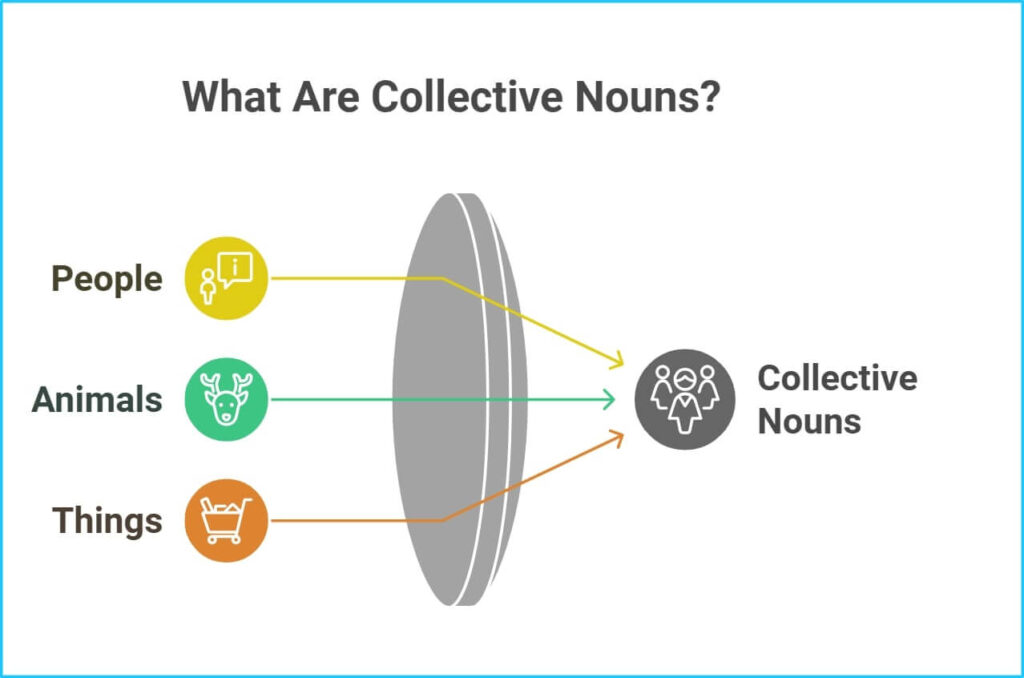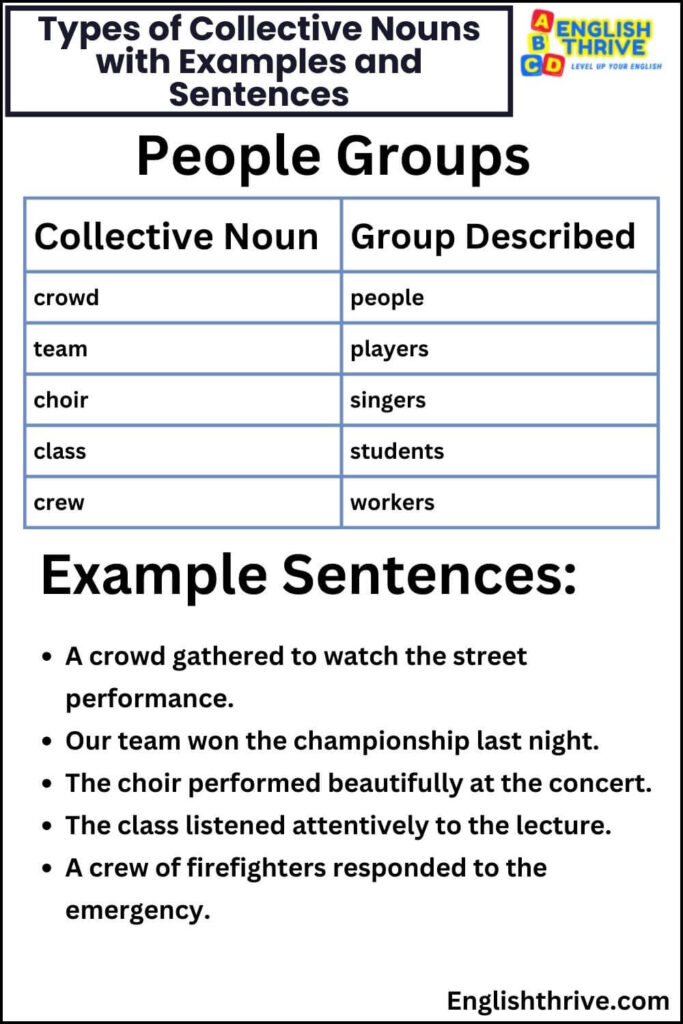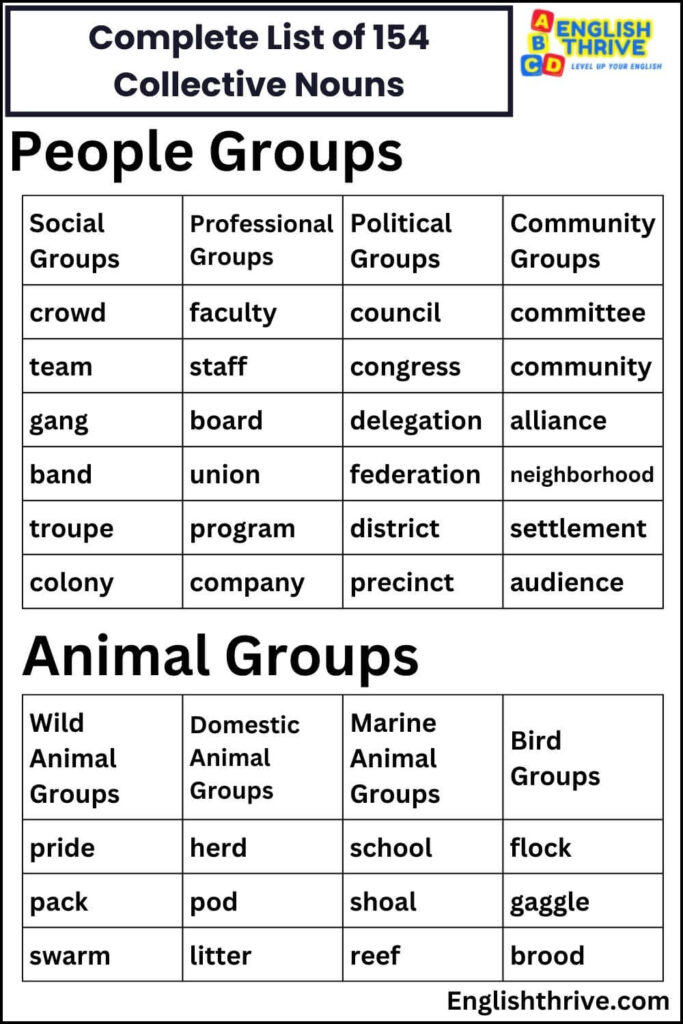Have you ever wondered why we call a group of lions a pride, but a group of wolves a pack? These special group names are collective nouns, and they add rich flavor to our language. As an English teacher I spent years helping students master these fascinating words, I’ll share 154 collective noun examples that will make your writing more vibrant and precise.
Contents
ToggleWhat Are Collective Nouns?
Collective nouns are words that describe a group, collection, or category of people, animals, or things as a single unit. Think of them as the family names for groups – just like the Smiths describes a family, a fleet describes a group of ships.

Types of Collective Nouns with Examples
1. People Groups
| Collective Noun | Group Described |
|---|---|
| crowd | people |
| team | players |
| choir | singers |
| class | students |
| crew | workers |
Example Sentences:
- A crowd gathered to watch the street performance.
- Our team won the championship last night.
- The choir performed beautifully at the concert.
- The class listened attentively to the lecture.
- A crew of firefighters responded to the emergency.
2. Animal Groups
| Collective Noun | Group Described |
|---|---|
| pride | lions |
| flock | birds |
| school | fish |
| pack | wolves |
| swarm | bees |
Example Sentences:
- A pride of lions roamed the savannah.
- A flock of geese flew overhead.
- A school of fish swam beneath our boat.
- A pack of wolves hunted in the forest.
- A swarm of bees buzzed around the flowers.
3. Object Groups
| Collective Noun | Group Described |
|---|---|
| bunch | keys |
| set | tools |
| stack | books |
| fleet | ships |
| bouquet | flowers |
Example Sentences:
- She carried a bunch of keys on her belt.
- He bought a new set of tools for the garage.
- A stack of books sat on the desk.
- The fleet of ships sailed into the harbor.
- She arranged a beautiful bouquet of flowers.
4. Food and Plant Groups
| Collective Noun | Group Described |
|---|---|
| bunch | bananas |
| head | lettuce |
| grove | trees |
| bushel | apples |
| cluster | grapes |
Example Sentences:
- Mom bought a bunch of bananas from the market.
- The farmer harvested a head of lettuce.
- We picnicked in a grove of oak trees.
- The orchard produced fifty bushels of apples.
- A cluster of grapes hung from the vine.
5. Professional Groups
| Collective Noun | Group Described |
|---|---|
| faculty | teachers |
| board | directors |
| panel | judges |
| cast | actors |
| orchestra | musicians |
Example Sentences:
- The faculty met to discuss curriculum changes.
- The board of directors approved the new policy.
- A panel of judges evaluated the competition.
- The cast took their final bow after the performance.
- The orchestra played Beethoven’s Fifth Symphony.

Complete List of 154 Collective Nouns
People Groups
| Social Groups | Professional Groups | Political Groups | Community Groups |
|---|---|---|---|
| crowd | faculty | council | committee |
| team | staff | congress | community |
| gang | board | delegation | alliance |
| band | union | federation | neighborhood |
| troupe | program | district | settlement |
| colony | company | precinct | audience |
Animal Groups
| Wild Animal Groups | Domestic Animal Groups | Marine Animal Groups | Bird Groups |
|---|---|---|---|
| pride | herd | school | flock |
| pack | pod | shoal | gaggle |
| swarm | litter | reef | brood |
| drove | nest | colony | choir |
| constellation | array | constellation | cluster |
| series | set | series | series |
Object Groups
| Collection Types | Storage Groups | Organizational Groups | Arrangement Groups |
|---|---|---|---|
| bunch | crate | suite | stack |
| batch | block | complex | pile |
| set | heap | system | array |
| bundle | chain | cabinet | lot |
| collection | train | cycle | cluster |
| mass | fleet | series | pattern |
Nature Groups
| Plant Groups | Landscape Groups | Environmental Groups | Natural Formations |
|---|---|---|---|
| grove | forest | thicket | copse |
| orchard | meadow | reef | hedge |
| cluster | range | garden | bank |
| series | block | series | quarter |
| bouquet | mass | complex | succession |
| lot | estate | set | sequence |
Activity Groups
| Performance Groups | Work Groups | Sports Groups | Event Groups |
|---|---|---|---|
| orchestra | crew | squadron | parade |
| team | platoon | regiment | procession |
| series | routine | battalion | series |
| set | program | company | set |
| troupe | routine | division | assembly |
| group | process | lot | convoy |
Professional Groups
| Workplace Groups | Academic Groups | Service Groups | Creative Groups |
|---|---|---|---|
| faculty | school | unit | band |
| board | program | squad | troupe |
| staff | staff | team | orchestra |
| panel | committee | crew | ensemble |
| committee | league | alliance | collective |
| union | stock | set | group |
Food Groups
| Agricultural Groups | Food Collection Groups | Culinary Groups | Distribution Groups |
|---|---|---|---|
| bunch | bushel | batch | supply |
| batch | bundle | set | stock |
| set | collection | series | lot |
| cluster | series | suite | collection |
| lot | set | complex | array |
| mass | array | pattern | system |
Building Groups
| Urban Groups | Architectural Groups | Residential Groups | Organizational Spaces |
|---|---|---|---|
| village | complex | estate | tower |
| district | block | suite | bank |
| neighborhood | system | settlement | lot |
| community | series | quarter | precinct |
| alliance | set | garden | section |
| block | batch | lot | cluster |
Vehicle Groups
| Transportation Groups | Vehicle Collections | Mobility Groups | Movement Formations |
|---|---|---|---|
| fleet | caravan | motorcade | train |
| convoy | flotilla | set | row |
| series | array | series | parade |
| set | cycle | unit | procession |
| battalion | set | bank | mass |
| group | lot | alliance | collection |
Miscellaneous Groups
| Organizational Groups | Measurement Groups | Structural Groups | Conceptual Groups |
|---|---|---|---|
| group | lot | batch | series |
| set | mass | set | suite |
| series | system | cluster | complex |
| suite | complex | pattern | set |
| batch | stack | heap | array |
| collection | array | bank | cycle |

Additional Classifications:
Art & Entertainment
- anthology (poems)
- gallery (paintings)
- repertoire (songs)
- portfolio (artwork)
Business & Commerce
- consortium (companies)
- chain (stores)
- syndicate (businesses)
- conglomerate (corporations)
Military & Defense
- arsenal (weapons)
- battery (guns)
- fleet (warships)
- squadron (aircraft)
FAQs about Collective Nouns Examples
1. Why are collective nouns important in English?
Collective nouns are crucial for several reasons:
- They provide precision in communication
- They add color and variety to language
- They help maintain cultural and historical connections
- They improve writing style and sophistication
- They demonstrate mastery of English vocabulary
For example, saying “a pride of lions” instead of “a group of lions” not only sounds more sophisticated but also carries cultural and historical significance.
2. How do you choose the correct verb form with collective nouns?
The choice between singular and plural verbs depends on whether you’re emphasizing the group as a unit or its individual members:
- Singular (group acting as one): “The team is practicing today.”
- Plural (individuals acting separately): “The team are wearing their new uniforms.”
British and American English sometimes differ in this usage, with British English more likely to use plural verbs with collective nouns.
3. What are some uncommon but interesting collective nouns?
Some fascinating collective nouns include:
- A murder of crows
- A parliament of owls
- A troubling of goldfish
- A shrewdness of apes
- A kindle of kittens
- A murmuration of starlings
- A constellation of satellites
- A galaxy of astronauts
These unique terms often have historical or observational origins that reflect the nature or behavior of the group they describe.
4. How do collective nouns evolve over time?
Collective nouns evolve through:
- Common usage adoption
- Cultural changes
- Professional terminology development
- Social media influence
- Regional variations
For example, modern collective nouns like “a zoom of meetings” or “a google of searches” have emerged from technological advances.
5. When should you use collective nouns in writing?
Use collective nouns to:
- Add precision to descriptions
- Enhance literary quality
- Demonstrate language expertise
- Create vivid imagery
- Maintain professional tone
However, ensure your audience will understand the collective noun; sometimes a simpler term might be more appropriate.
Conclusion
Understanding and using collective nouns enriches your English language skills and makes your communication more precise and engaging. These 154 collective noun examples demonstrate the rich variety of ways English describes groups and collections. Whether you’re writing professionally or casually, mastering collective nouns will elevate your language use and help you communicate more effectively.

